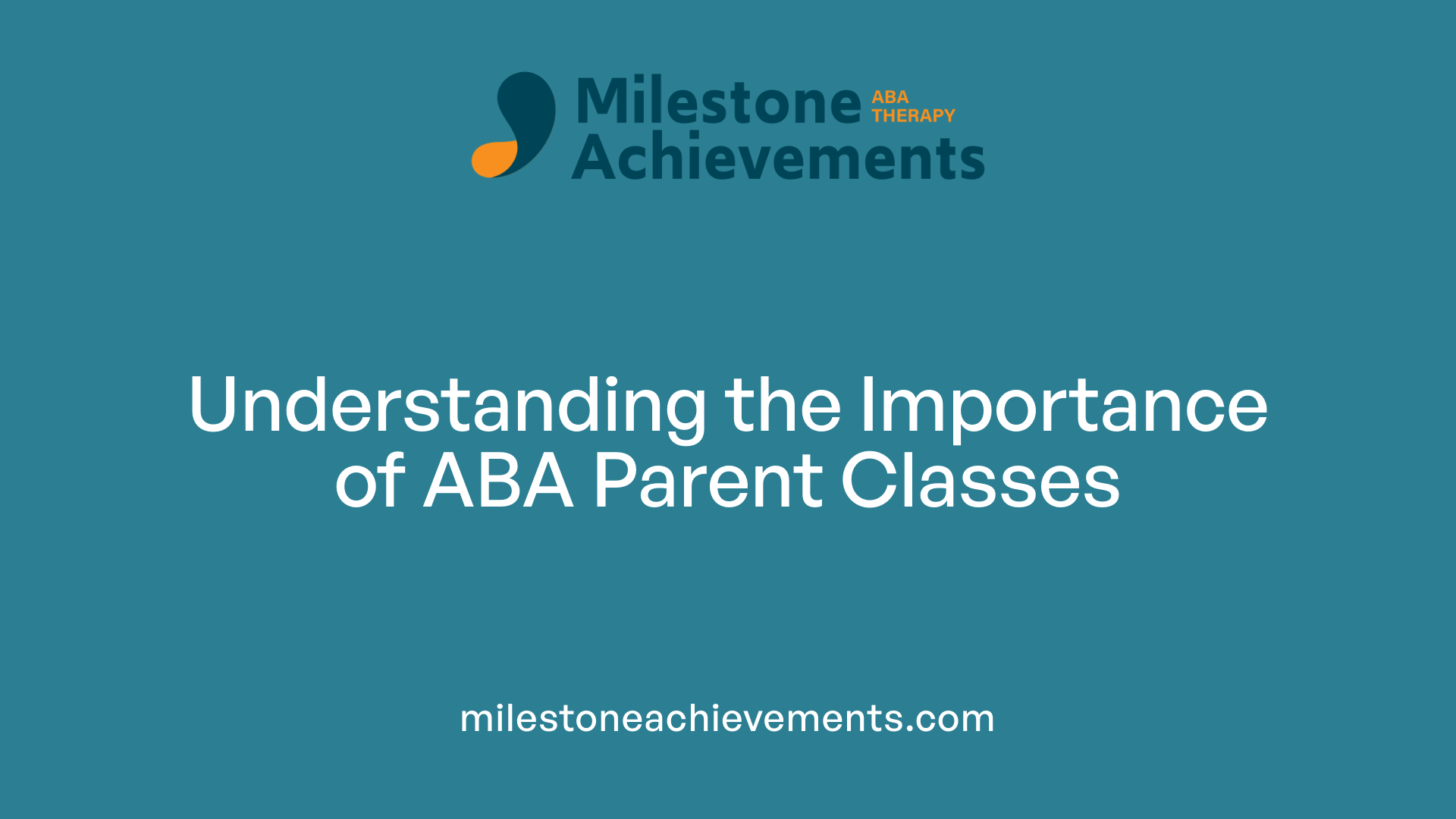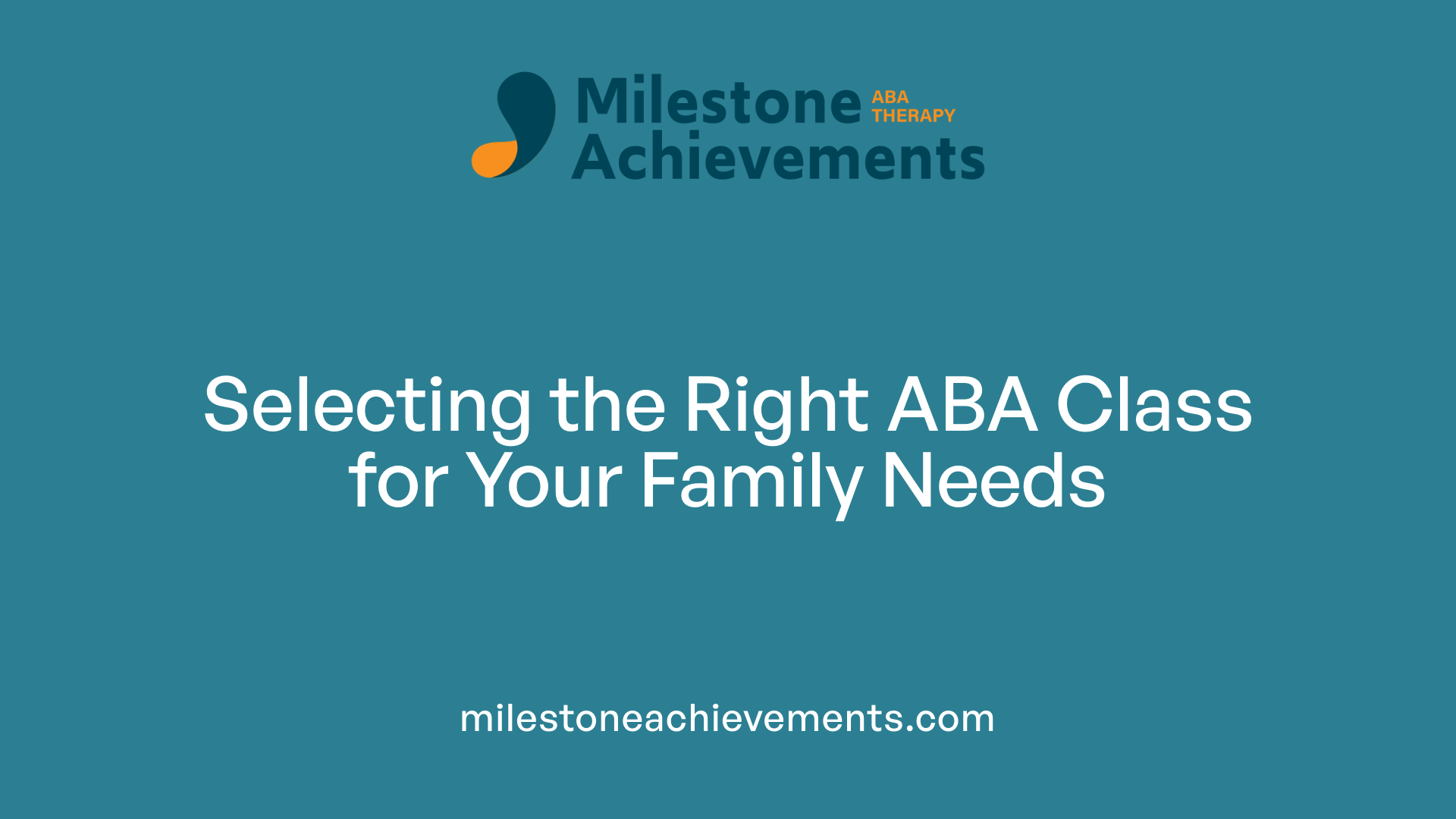Aba Classes for Parents
Empowering Parents through ABA Training

Understanding the Role of ABA Classes for Parents
Applied Behavior Analysis (ABA) is a well-established and effective therapy for supporting the development of children with autism and other related developmental disorders. As part of this therapeutic approach, parent training becomes crucial, empowering families to effectively apply ABA principles in everyday situations. This article explores the significance of ABA classes for parents, the available options, and how they can transform family dynamics.
What is the ABA Parent Class?

Purpose of ABA classes for parents
The ABA parent class focuses on equipping parents of children with autism with effective strategies rooted in Applied Behavior Analysis (ABA) principles. These classes help parents understand how to implement targeted treatment plans that cater to the specific needs of their children.
Key components and strategies covered
The classes cover various key components, including:
- Understanding Behavioral Principles: Parents learn the A-B-C model (Antecedent, Behavior, Consequence) to effectively analyze and modify behavior.
- Reinforcement Techniques: Parents discover the importance of positive reinforcement in encouraging desirable behaviors, tailored to what resonates with their child.
- Data Collection Methods: Parents are taught to gather and analyze data to track behavioral changes, ensuring they can effectively monitor their child’s progress.
- Role-Playing Exercises: This hands-on approach allows parents to practice new skills, boosting their confidence in applying ABA strategies at home.
Integration of technology and family involvement
With the integration of new technologies like Virtual Reality, ABA therapy is evolving to enhance learning and effectiveness. Additionally, involving siblings in therapy not only improves family dynamics but also fosters empathy and relationship building. When siblings actively participate, they often become role models, leading to better developmental outcomes for children. Ultimately, these classes enable parents to better support their children's growth and independence, benefiting the entire family unit.
Empowering Parents with ABA Techniques

Can parents learn ABA therapy?
Yes, parents can learn ABA therapy techniques through various educational resources and training programs designed specifically for them. Many online platforms offer video workshops and structured courses that teach foundational ABA principles and practical strategies.
Parents can also participate in specialized training programs that address specific challenges related to their child's behavior. These programs often vary in length and cost, allowing parents to choose options that fit their schedules and budgets.
What are the benefits of learning ABA techniques?
Learning ABA techniques not only empowers parents with the skills needed to support their child's therapy at home but can lead to significant improvements in behavior and social skills. Some benefits include:
- Enhanced parental involvement: Parents actively participate in their child's therapy, fostering growth and independence.
- Targeted strategies: Parents learn to identify and reinforce positive behaviors while implementing methods to decrease unwanted behaviors.
- Generalization of skills: Proper training ensures that learned skills are applicable across various settings, improving overall functioning.
Additional Information
Parents can implement practical activities like 'Sit In Chair' and 'Look At Me' to reinforce learning at home. This approach encourages consistent practice and allows parents to apply what they've learned, ensuring that ABA strategies are part of their child's routine.
Choosing the Best ABA Classes for Parents

What are the best ABA classes for parents?
The ideal ABA classes for parents are those that provide thorough training in Applied Behavior Analysis techniques, particularly during periods of reduced therapy services. Such courses should cover important areas, including:
- Imitation and Joint Attention: Helping children with autism to improve social interaction skills.
- Increasing Behavior: Strategies to reinforce positive behavior effectively.
- Naturalistic Teaching Strategies: Integrating learning into everyday activities to enhance retention and application.
Platforms like Joon and CR Care Coordinator offer evidence-based resources tailored to parents. These resources include customized lessons that aim to engage parents actively in their child’s development.
Recommended books, such as the ABA Visualized Guidebook and the One-Year ABA Parent Training Curriculum, are excellent resources for parents wanting to deepen their understanding of ABA principles. These texts provide practical guidance and tips to foster meaningful engagement in the ABA process.
Criteria for evaluating ABA programs
When selecting an ABA program, parents should consider the following:
- Inclusivity of Comprehensive Training: Ensure the program covers both behavioral reduction and skill acquisition.
- Flexibility of Resources: Evaluate whether the program can be adapted to individual needs and learning environments.
- Evidence-Based Curriculum: Look for programs that cite research to support their methods and effectiveness.
- Instructor Qualifications: Check for programs led by qualified Behavior Analysts (BCBAs), ensuring a high standard of training.
Quality ABA parent training can significantly enhance family dynamics and lead to improved outcomes for children with autism, making the right choice crucial for long-term success.
Cost-Effective Options: Free ABA Classes for Parents

Are there free ABA classes available for parents?
Yes, there are several free ABA classes accessible for parents. These classes are specifically designed to teach parents the core principles and techniques of Applied Behavior Analysis (ABA), empowering them to support their children with autism effectively.
Parents can enroll in online courses that cover critical topics such as understanding behavior, reinforcement strategies, and specific behavior management techniques, including how to address challenges like tantrums and self-injurious behaviors.
What topics are covered in free classes?
The offerings focus on a range of essential skills and knowledge for parents, including:
- Understanding Behavior: Fundamentals of what drives behavior in children.
- Reinforcement Strategies: Techniques to encourage and reinforce positive behaviors.
- Behavior Management: Approaches for addressing specific behaviors effectively.
- Communication Promotion: Methods to foster communication skills in their children.
- Effective Routines: Structuring daily tasks to support independence.
Additionally, parents can access trial eLearning courses and lesson plans by registering with their email, making these valuable resources easily available. Overall, such classes are tailored to enhance parental skills and ensure better outcomes for their children.
Online Accessibility of ABA Training

Can ABA parent training be accessed online?
Yes, ABA parent training can be accessed online. Numerous programs and courses offer parents a flexible way to learn and implement ABA strategies in their own homes. These platforms frequently provide video workshops, curriculum-based content, and specialized training tailored to various challenges that may arise during the parenting journey.
Benefits of online ABA training
- Convenience: Parents can access resources at their own pace, fitting training into their busy schedules.
- Variety of Programs: Options range from basic informational sessions to comprehensive certificate courses.
- Diverse Learning Materials: Many courses utilize videos and interactive content to engage parents.
Structure of online ABA courses
Online ABA courses typically encompass multiple components, including:
- Fundamentals of ABA: Understanding core principles that enhance behavior management.
- Behavior Change Techniques: Strategies to promote positive behaviors and skill acquisition.
- Reinforcement Systems: Methods for implementing effective rewards tailored to individual needs.
- Skill Application: Learning how to apply ABA techniques in real-world settings, benefiting both the child and the family dynamic.
In summary, the online accessibility of ABA training provides invaluable support for parents looking to enhance their child's development while improving family life.
Materials to Support ABA Parent Training
What materials are available for ABA parent training?
There are several valuable materials available for ABA parent training, designed to equip parents with effective strategies for supporting their child's development. A comprehensive guide outlines the fundamental components of Applied Behavior Analysis (ABA), illustrating its effectiveness in treating autism. This guide dives into essential methods like:
- Discrete Trial Teaching
- Incidental Teaching
- Natural Environment Teaching
These approaches not only teach parents how to implement ABA strategies but also help them identify and measure problem behaviors.
Furthermore, the guide incorporates interactive exercises and quizzes to reinforce learning. This hands-on approach ensures that parents understand socially significant behaviors and can apply ABA concepts effectively in real-life situations.
Interactive elements and resources
In addition to the detailed guide, the website offers free resources that may include downloadable parent training materials and video workshops. Such materials provide:
- Access to Online Courses: Covering various topics at different levels.
- Practice Exercises: Encouraging parents to engage actively with the content.
- Support Networks: Connecting parents with others in similar situations for sharing experiences and strategies.
These resources collectively empower parents to implement ABA techniques at home, improving both their child's behavior and overall family quality of life.
Understanding the Requirements and Rules of ABA Therapy
What are the 7 requirements of ABA therapy?
The seven requirements of Applied Behavior Analysis (ABA) are critical in ensuring effective interventions. These requirements are outlined by its dimensions:
| Dimension | Description | Significance |
|---|---|---|
| Applied | Focuses on addressing socially significant problems. | Targets real-life issues faced by children and families. |
| Behavioral | Centers on observable and measurable behaviors. | Ensures that interventions can be quantified. |
| Analytic | Provides evidence of the effectiveness of interventions. | Validates therapy outcomes through data analysis. |
| Technological | Requires interventions to be replicable with detailed protocols. | Facilitates consistent application by various practitioners. |
| Conceptual | Utilizes principles of behavior analysis for guidance. | Ensures interventions are grounded in behavioral theory. |
| Effective | Interventions must lead to significant behavior changes. | Confirms the practical impact of therapy. |
| Generality | Ensures behavior changes are maintained across different settings. | Supports long-term success and generalization of skills. |
What are the essential rules of ABA therapy?
Consistency is paramount in ABA therapy. It reinforces learning and behavior alteration effectively. Here are some essential rules that guide this therapeutic approach:
- Positive Reinforcement: Encourages desired behaviors by rewarding them, making repeated behavior more likely.
- Data Collection: Systematic tracking of progress is vital. It allows practitioners to evaluate effectiveness and adjust strategies accordingly.
- Individualized Treatment Plans: Each client’s plan should be tailored to their specific needs to ensure relevance and effectiveness.
- Collaborative Communication: Clear communication among all stakeholders—including parents and teachers—enhances therapy's overall success by aligning goals and methods.
- Natural Settings: Applying interventions in everyday environments promotes the generalization of learned behaviors, making skills more functional.
These foundational elements bolster the effectiveness of ABA therapy, making it an impactful tool in supporting children's development.
Finding Practical Resources for ABA Parent Training
Where to find ABA parent training PowerPoint resources?
ABA parent training resources are often available online, making them accessible for many families. One notable resource is the 7 Steps Parent Training PowerPoint, part of a comprehensive curriculum designed to guide parents in implementing ABA strategies at home effectively. This curriculum includes free lesson plans that cover essential techniques to promote behavioral change.
Another valuable resource is the ACHIEVE Parent Training Curriculum. This structured program not only focuses on teaching positive behavior management but also provides strategies for skill acquisition, enhancing both the child's development and parental engagement.
Research has highlighted the benefits of structured ABA training, revealing that parents who participate can see a significant reduction in challenging behaviors in their children. This illustrates just how impactful utilizing these resources can be for family dynamics.
For those interested in exploring further, searching for terms like "PowerPoint resources for ABA parent training" can lead to more websites offering beneficial materials that support parents in their training journey.
Enhancing Family Life through ABA
By participating in ABA parent training, families gain valuable skills to understand and address their child’s behavioral challenges. These classes provide a supportive framework, helping to reduce stress and improve overall family functioning. With numerous online and free resources available, parents are empowered to effectively apply ABA strategies, fostering significant advancements in their child's development and enhancing the quality of life for the entire family.
References
- ABA Parent Training: Curriculum, CEUs, Support, & More
- ABA Education for Parents: 7 Steps to Coach Parents in ABA
- ABA Training for Parents: All You Need to Know
- ABA Parent Training: The Complete Guide To Helping ... - Master ABA
- Applied Behavior Analysis (ABA) | Boston Medical Center
- Applied Behavior Analysis (ABA) | Autism Speaks
- ABA Parent Training: Curriculum, CEUs, Support, & More
- [PDF] Applied Behavior Analysis (ABA) Parent Training Handouts
- FREE ABA Resources!! - I Love ABA!







